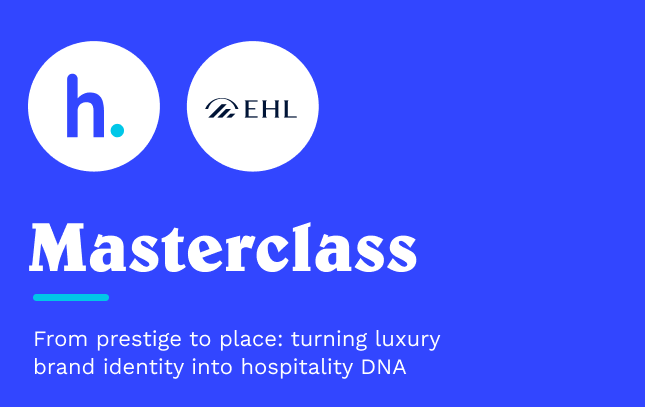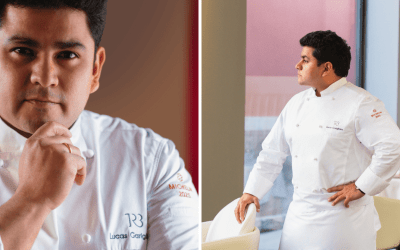From Prestige to Place: Translating Luxury Brand Identity into Hospitality DNA
What happens when a century-old gourmet brand decides to enter the luxury hospitality space? Can a brand’s heritage, emotion, and values truly be translated into an immersive guest experience?
These were the questions explored during the June 2025 EHL Masterclass hosted by Hosco, featuring Jacques-Olivier Chauvin, President & CEO of FAUCHON Hospitality, and Dr. Florent Girardin, Professor of Luxury Brand Management at EHL Hospitality Business School. The session, moderated by Raksha Daryanani, offered insightful conclusions rare insights into the challenges and creative processes behind extending an iconic legacy brand like FAUCHON into the world of luxury hotels.
Throughout the session, Chauvin and Girardin unpacked what it takes to build a hospitality brand rooted in emotion, gastronomy, and French savoir-faire—and how authenticity, intentionality, and consistency are essential for success in today’s experience-driven luxury market.
Defining Luxury Through Emotion, Not Category
What is luxury today? According to Jacques-Olivier Chauvin, the answer has shifted significantly in recent years. “Luxury is not defined by a price or category. It’s defined by how people feel.” This emotional dimension is what sets apart true luxury experiences from transactional services.
Dr. Florent Girardin echoed this sentiment. “Luxury isn't about features. It’s about the feeling of authenticity, the sense that the brand is true to itself and its promise.” Citing years of consumer behavior research, Girardin explained that modern luxury consumers are drawn to experiences that create emotional connection and reflect their personal values.
This emotional anchoring becomes especially important in hospitality, where each guest interaction is a chance to tell the brand’s story in a multisensory, human way.
At FAUCHON, a French gourmet institution founded in 1886, this means taking a legacy of craftsmanship and gastronomy and turning it into a lived, luxurious guest experience. Their boutique hotel in Paris, opened in 2018, does just that—delivering design, service, and gastronomy infused with the brand’s Parisian personality.
Brand Consistency Across Cultures
One of the most difficult challenges in translating a luxury brand into hospitality is maintaining consistency across markets while adapting to local cultures. This balance was a major topic during the discussion.
Chauvin explained that FAUCHON’s hospitality expansion requires a carefully constructed brand manual that details every element—from scent and lighting to uniform design and language tone. “We have 150 touchpoints across the guest journey, and each one is an opportunity to express the FAUCHON brand.”
However, he emphasized that “consistency does not mean cloning.” The experience must retain the brand’s core identity while respecting cultural differences. For instance, FAUCHON Kyoto reflects Japanese design elements while maintaining French culinary identity. “It’s not copy-paste,” Chauvin said. “It’s interpretation through the brand lens.”
This concept aligns with McKinsey’s analysis, which highlights that successful organizations create adaptive, context-aware operations that balance consistent identity with market-specific nuances.
Dr. Girardin noted that this type of thoughtful adaptation is what preserves authenticity—because luxury consumers quickly detect when something feels superficial or forced. “They are sensitive to coherence. If the details don’t align, they will notice.”
Gastronomy as Brand Signature
For FAUCHON, the gastronomy element is more than a service—it’s the brand’s DNA. From room service menus to signature desserts, food and beverage offerings are curated to reflect the brand’s gourmet roots.
“FAUCHON is gastronomy before it is hospitality,” said Chauvin. “Our hotel experience is built around indulgence, creativity, and the Parisian art de vivre.” From the FAUCHON gourmet bar in every room (a stylish, design-forward minibar with curated delicacies) to afternoon teas served with signature éclairs, each moment is crafted to evoke sensory pleasure.
Girardin underscored how this approach sets FAUCHON apart from traditional hotel brands. “Their heritage gives them an authentic point of differentiation. They’re not inventing a lifestyle—they’re extending one.”
This deep integration of food, design, and storytelling is what enables FAUCHON to transform brand prestige into hospitality reality. It’s not about replicating a logo on a pillow; it’s about creating a stay that feels like FAUCHON.
Recruiting for Culture Fit, Not Just Skills
A recurring theme throughout the conversation was the importance of people. For both panelists, brand expression ultimately comes down to the employees—how they understand, embody, and convey the brand to guests.
“Recruiting in luxury hospitality is not only about competencies. It’s about attitude,” said Chauvin. “You can train people on procedures, but not on emotion or savoir-être.”
This is especially important for brands like FAUCHON that emphasize personalized service and character. “Our staff are brand ambassadors. They need to express warmth, elegance, and precision—without being scripted.”
Chauvin described how their recruitment process focuses on values and emotional intelligence. “We’re looking for people who are curious, passionate, and authentic. People who will make the guest feel special, not just serve them.”
This approach aligns with Deloitte’s Human Capital Trends 2023, which highlights the growing importance of emotional intelligence and human-centric leadership in hospitality and service roles.
Girardin added that training should not be limited to operational skills. “Brand training is essential. Staff need to understand the why behind the what. Why do we serve things a certain way? Why does the music matter? That’s how you create coherence.”
A New Model for Luxury Brand Expansion
The conversation also touched on how FAUCHON’s expansion strategy differs from traditional hotel groups. Rather than scale rapidly or replicate properties, they are pursuing a boutique approach—opening in select cultural capitals where their gourmet identity can resonate.
After Paris and Kyoto, FAUCHON is expanding to Riyadh, with future openings in the US and Latin America. But each site is chosen with intention, and each experience is carefully crafted. “We are not a hotel chain,” said Chauvin. “We are a hospitality maison.”
This slow-growth, high-precision model contrasts with the asset-light expansion many hotel brands pursue, but it aligns with what modern luxury travelers seek: uniqueness, authenticity, and emotional resonance.
Girardin emphasized that this model reflects a broader trend. “Consumers today are tired of standardization. They want experiences that are crafted, meaningful, and aligned with a brand’s true spirit.”
Legacy and Innovation Go Hand in Hand
Finally, the speakers addressed the tension between honoring legacy and embracing innovation—a challenge for any heritage brand.
Chauvin shared how FAUCHON strikes this balance: “We are rooted in tradition, but not stuck in it. Innovation is not about technology—it’s about interpretation. How do you reinvent a classic in a way that feels fresh but still FAUCHON?”
This philosophy drives everything from the hotel’s design partnerships to its gourmet collaborations. By staying true to their DNA while pushing boundaries, FAUCHON ensures their brand evolves without losing its soul.
This principle echoes insights from WTTC’s Consumer Trends report, which highlights how blending cultural heritage with innovation is essential to meet the evolving expectations of modern luxury travelers.
Conclusion: Prestige Comes Alive in the Details
At its heart, the masterclass revealed how transforming a prestigious brand into a successful hospitality concept requires more than clever marketing or design. It demands emotional clarity, operational coherence, and cultural intentionality.
FAUCHON’s journey illustrates how legacy, when interpreted thoughtfully, becomes a strength—not a constraint. By focusing on emotion, brand training, design consistency, and curated gastronomy, they are crafting a model for luxury hospitality that is both rooted and modern.
As Dr. Girardin summarized, “Luxury is not static. It’s a lived experience. And that experience must feel personal, authentic, and complete.”
In today’s competitive hospitality landscape, turning brand prestige into hospitality DNA is not only an art—it’s a business imperative.
External Sources Cited:




